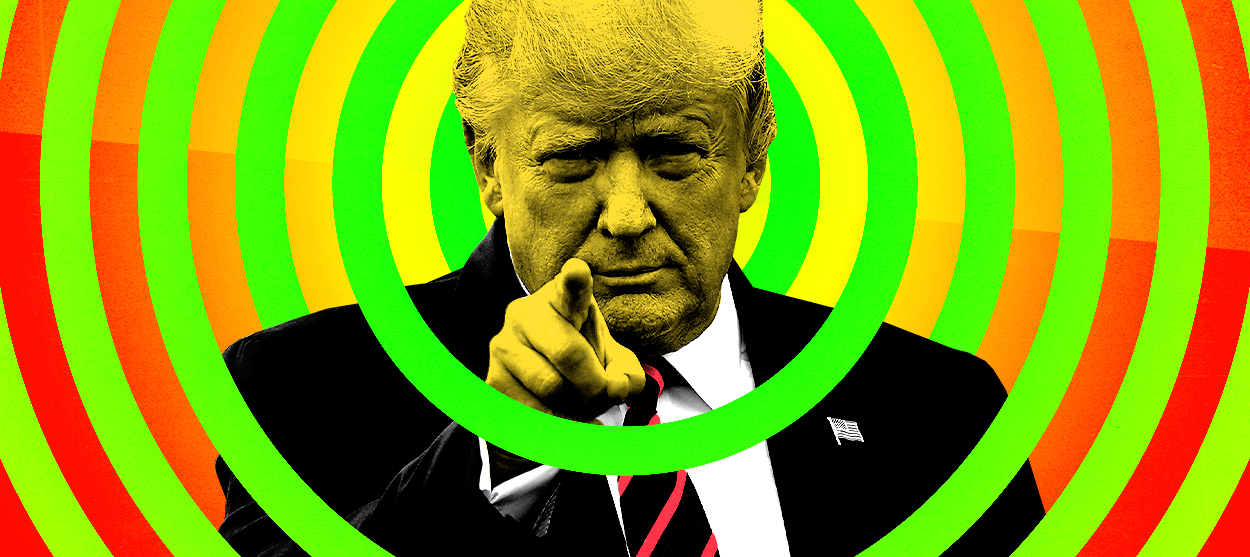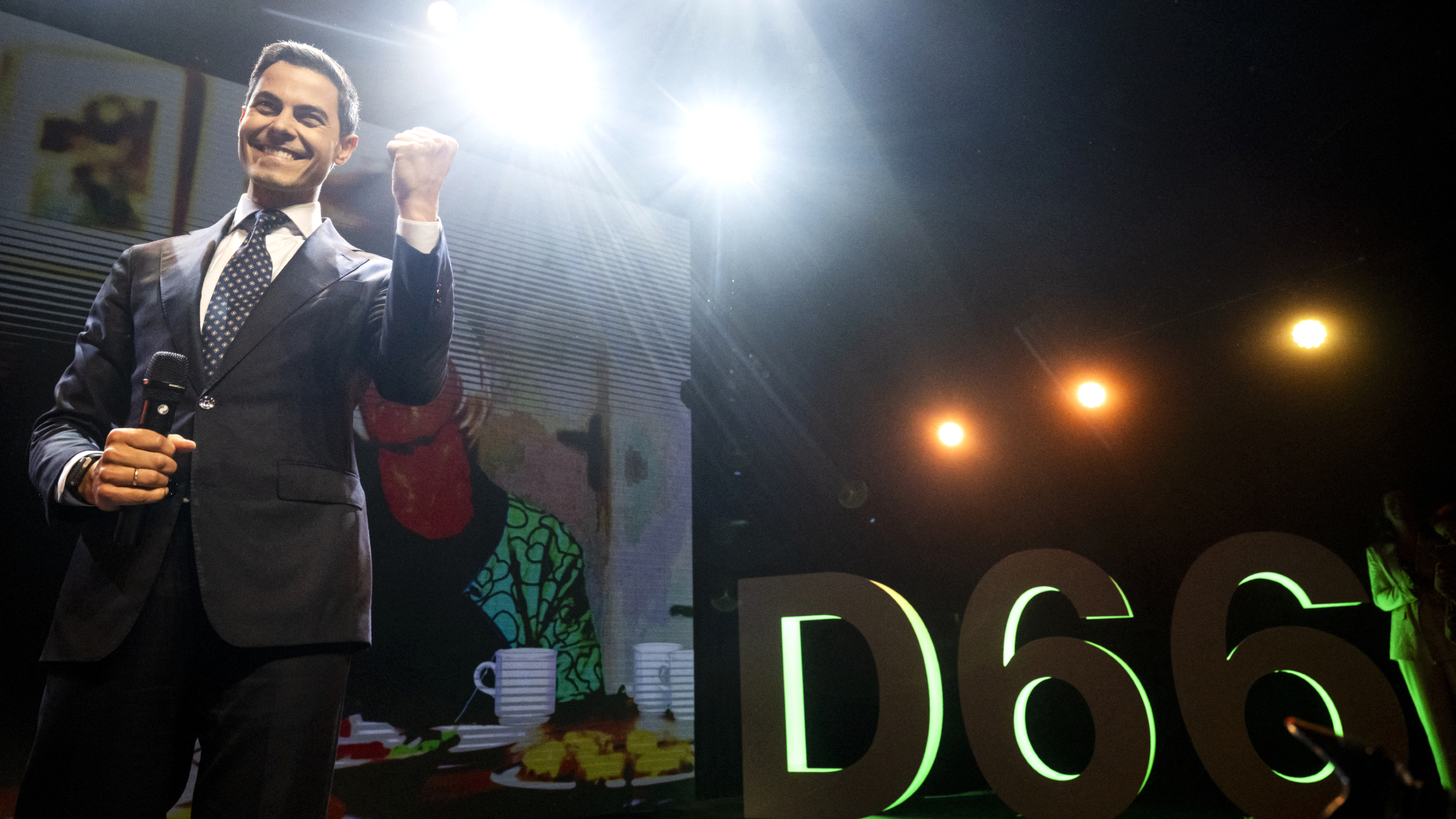Why Trump's re-election still seems likely
He's not going anywhere


A free daily email with the biggest news stories of the day – and the best features from TheWeek.com
You are now subscribed
Your newsletter sign-up was successful
We are apparently living in a blue world, like the one described in that Eurotrash novelty song. The question is not whether Joe Biden is going to be the next president of the United States, but how big the margin will be. Will he win 300 electoral votes? Four hundred? How many states is he going to flip in the Solid South? When will the Truth and Reconciliation process begin? How soon after the inauguration will the media declare that the war against COVID has been won?
These things are, with one obvious exception, being discussed by The New York Times, The Economist, that one sports statistics blog, and the rest of the usual suspects with the sort of yawn-inducing certainty you would expect. The best odds I can find for President Trump's re-election in any mainstream publication are 12 percent, but other able prognosticators are more likely to put his chances in the low single digits.
There have always been good reasons to think otherwise, though, and I don't just mean the cookie augurs. The most obvious one is that Trump has done this before. Americans have only sent an elected incumbent packing two times in living memory, in 1992 and 1980. Two of our living former presidents, Bill Clinton and Barack Obama, could probably have been re-elected if it were not for term limits. Besides, the single most reliable modern indicator of a president's chance of re-election is, alas, the performance of the stock market.
The Week
Escape your echo chamber. Get the facts behind the news, plus analysis from multiple perspectives.

Sign up for The Week's Free Newsletters
From our morning news briefing to a weekly Good News Newsletter, get the best of The Week delivered directly to your inbox.
From our morning news briefing to a weekly Good News Newsletter, get the best of The Week delivered directly to your inbox.
Working against Trump's built-in advantages as an incumbent are, of course, everything. The various entries in the James Comey-Russia Cinematic Universe, impeachment, scientifically dubious lockdown measures (the economic costs of which his opponents blame on the president who half-heartedly opposed them), what amounts to a conspiracy between social media monopolies and the mainstream media to prevent the dissemination of stories damaging to his opponent, his own rather indifferent record in office. I think it is fair to say that Trump is playing the presidency on All-Madden difficulty.
For all that, I still think the bad orange man has a shot. In fact, my guess is that he will be re-elected and that his margin in the Electoral College will be similar to the one he enjoyed last time, and perhaps even larger. If you seriously believe that Democrats are going to flip Georgia, North Carolina, Florida, and Texas together, you are in urgent need of attention from a licensed medical professional. Likewise if you believe that he is going to lose by as many as 11 points in any of the other states he won last time. Millions of people have not changed their minds about whether the guy who told Macaulay Culkin where the bathroom is should be our commander-in-chief.
Which is why a better question to ask is not whether his opponent will be able to speed up the inevitable transformation of the New South into a bastion of suburban liberalism, but whether Trump will be able to consolidate the gains he made last time. Even if he cannot, a loss is far from certain. If Arizona holds, Biden needs to flip back Michigan, Wisconsin, and Pennsylvania. If Trump hangs on in even one of these states, he wins another narrow victory. This to say nothing of the distinct possibility that he could add Minnesota, where he appears to be doing considerably better than he was four years ago, when an apparent double-digit lead for Hillary Clinton metamorphosed on Election Day into a very thin margin.
Apart from his incumbent status and the enthusiasm of his most fervent supporters, who love him as no president has been loved since Kennedy or perhaps even FDR, the best thing Trump has going for him is the fact that he has an actual ground game. His campaign has been knocking on doors, a million a week, and doing all the other boring things that Biden fans are glad to have an excuse for ignoring this year. (As more than one observer has pointed out, a ground game matters, even in California, where Republicans were able to take back former Rep. Katie Hill's seat in a special election earlier this year.)
A free daily email with the biggest news stories of the day – and the best features from TheWeek.com
What other evidence is there to suggest that polls are wrong and Trump is less than a week away from re-election? Plenty: The fact that Republicans are winning the war for new voter registrations in Pennsylvania and North Carolina, for one thing. The likelihood that Democrats' edge in early voting will not be large enough to withstand the onslaught waiting on the actual day of the election in the most competitive states. The failure of Democrats to ensure that even the least engaged would-be voters people who cannot bother to mail in their ballots at any point in the months-long window before November 3 — get to participate. The so-called social desirability bias, which gave us the very real shy Trump phenomenon in 2016, and the cultural differences between his supporters and Biden's that make the former less likely to answer 25 boring consecutive questions from a stranger on the telephone. Finally, the bias of pollsters themselves, whose real vocation is to influence rather than to measure public opinion.
If the polls are wrong again, especially the ones showing Biden with comfortable leads, the industry as we know it should disappear. The only thing in this election I am absolutely certain of is that this will not happen.
Editor's note: This article originally contained a historical inaccuracy about re-electing incumbent presidents. It has since been corrected. We regret the error.
Want more essential commentary and analysis like this delivered straight to your inbox? Sign up for The Week's "Today's best articles" newsletter here.
Matthew Walther is a national correspondent at The Week. His work has also appeared in First Things, The Spectator of London, The Catholic Herald, National Review, and other publications. He is currently writing a biography of the Rev. Montague Summers. He is also a Robert Novak Journalism Fellow.
-
 Political cartoons for February 14
Political cartoons for February 14Cartoons Saturday's political cartoons include a Valentine's grift, Hillary on the hook, and more
-
 Tourangelle-style pork with prunes recipe
Tourangelle-style pork with prunes recipeThe Week Recommends This traditional, rustic dish is a French classic
-
 The Epstein files: glimpses of a deeply disturbing world
The Epstein files: glimpses of a deeply disturbing worldIn the Spotlight Trove of released documents paint a picture of depravity and privilege in which men hold the cards, and women are powerless or peripheral
-
 Japan’s Takaichi cements power with snap election win
Japan’s Takaichi cements power with snap election winSpeed Read President Donald Trump congratulated the conservative prime minister
-
 How realistic is the Democratic plan to retake the Senate this year?
How realistic is the Democratic plan to retake the Senate this year?TODAY’S BIG QUESTION Schumer is growing bullish on his party’s odds in November — is it typical partisan optimism, or something more?
-
 The billionaires’ wealth tax: a catastrophe for California?
The billionaires’ wealth tax: a catastrophe for California?Talking Point Peter Thiel and Larry Page preparing to change state residency
-
 Bari Weiss’ ‘60 Minutes’ scandal is about more than one report
Bari Weiss’ ‘60 Minutes’ scandal is about more than one reportIN THE SPOTLIGHT By blocking an approved segment on a controversial prison holding US deportees in El Salvador, the editor-in-chief of CBS News has become the main story
-
 Has Zohran Mamdani shown the Democrats how to win again?
Has Zohran Mamdani shown the Democrats how to win again?Today’s Big Question New York City mayoral election touted as victory for left-wing populists but moderate centrist wins elsewhere present more complex path for Democratic Party
-
 Dutch center-left rises in election as far-right falls
Dutch center-left rises in election as far-right fallsSpeed Read The country’s other parties have ruled against forming a coalition
-
 Millions turn out for anti-Trump ‘No Kings’ rallies
Millions turn out for anti-Trump ‘No Kings’ ralliesSpeed Read An estimated 7 million people participated, 2 million more than at the first ‘No Kings’ protest in June
-
 Has the Gaza deal saved Netanyahu?
Has the Gaza deal saved Netanyahu?Today's Big Question With elections looming, Israel’s longest serving PM will ‘try to carry out political alchemy, converting the deal into political gold’
